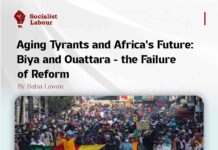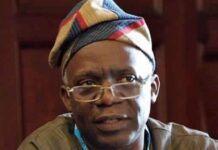By Biodun Olamosu
The singer Fela Anikulapo-Kuti will forever be remembered as an unrepentant crusader for social justice. He was a musical legend whose his fame traversed the length and breadth of the globe. His influence on Nigerian and African youths can only be compared with that of his hero, Kwame Nkrumah, the first President of Ghana. Fela died on August 2, 1997, at the age 59.
Background
The man Olufela Anikulapo Kuti was born into the famous Ransome-Kuti family, an upper class family in Abeokuta. Fela’s grandfather was a high school principal and a senior pastor. His father, Rev. Cannon Israel O. Ransome-Kuti, was also a Christian priest and principal of the famous Abeokuta Grammar School. He was also a trade unionist and a pioneer of the Nigerian Union of Teachers (NUT). His mother, Funmilayo Ransome-Kuti, was a well-known nationalist and woman activist. She was one of the patriots who fought for independence.
Though Fela was born with a silver spoon in his mouth, he nevertheless struggled for greatness, through endurance, consistency and sacrifice. He is a different man to different people, but all, including his foes, recognize his musical achievements.
Music
Music to Fela was not only an entertainment, but also a mission. For this reason, his music can hardly be differentiated from his politics. His music serves two purposes. First as entertainment and second as means to convey his political and philosophical ideas.
Fela from his youth was exposed to music. This was not an accident. His family was known to include admirers of good music and be music creators as well.
Fela learnt and perfected playing the piano when he was in his second year at Abeokuta Grammar School (secondary school). His interest in music started at this stage. Unlike many other musicians, Fela was an intellectual of high calibre. He left for Britain to study music at Trinity College London, a specialist music college, immediately after leaving secondary school in 1959.
The music of Fela passed through many stages. His music on coming back from Britain in 1963 was high life jazz (folklores). This was marked with love lyrics and commentaries on social related issues. This stage can best be described in his musical career as a period when he played music just for art’s sake. He had lyrics like “Jeun Koku” (eat and quench), “Onidodo Onimoinmoin” (plaintain and beans cake seller), “Omo Pupa” (yellow lady), “Ojuelegba Ojuelegba” (a notorious terminus in Lagos).
Fela’s music metamorphosed to Afro-beat in 1970 on his return from a tour of his musical shows in the USA. This later phase was influenced largely by his newly embraced philosophical outlook of Pan-Africanism which in the main stood for the promotion of the Black Man’s dignity (which we would now extend to Black Peoples’ dignity).
Afro-beat music was unique to him. He single-handedly created this brand of music, but was heavily influenced by other African musicians. This phase of Fela’s music is revolutionary. Since this period, he never looked back in the crusade against corruption, military dictatorship, colonialism, imperialism, neo-colonialism etc. His music came to serve as a weapon of mobilization for African emancipation. His lyrics in this respect among others include “Zombie-o-Zombie”, “Mr Follow Follow”, “Unknown Soldier”, “(I.T.T.) International-Thief-Thief”, “Yellow Fever”, etc.
Pan-Africanism
Fela’s trip to USA in 1969 coincided with the period when the Black Civil Rights Movement was at its peak. Black people in the USA were fighting and waging battle against racism, for equality, freedom and opportunity. People like Rev. Martin Luther King, Malcolm X, Angela Davis personified the Black nationalist struggle in US at the time (in the 1960’s and 1970’s). Fela was introduced into what is now known as African-American ideas by Sandra Smith, who herself was an activist. Sandra, according to Fela, introduced him to Malcolm X’s biography written by Alex Haley. It was the book that first changed his orientation before he came across other books such as: History of the Yorubas by Rev. James Johnson, Darwin’s book on evolution, On the Origin of Species, Dr. and Mrs. Leakey on evolution and others like Black Man of the Nile by Ben-Jochannan.
The pioneers of Black Nationalism included W.E.B. Du Bois, Marcus Garvey, George Padmore, Franz Fanon and Kwame Nkrumah. Malcolm X came up later to join this rank of top black nationalists. These people remained Fela’s heroes until he died.
Pan Africanist ideas basically preach unity of African people whose territories were artificially balkanized into separate countries by the European powers at the 1885 Berlin Conference. Pan Africanists also put a premium on promoting African culture so as to have self-respect for African ways of life including their history, family institutions and traditional religions that compare favourably well with other cultures and religions like Christianity and Islam. Fela was able to use his music to promote those objectives in his lyrics such as “Shuffering and Shmiling”, “Why Black Man Dey Suffer”, “Beasts of No Nation”, and he remained the best crusader of Black Nationalist ideas on African continent.
However, Pan Africanists tend to ignore the class nature of African society. It was African leaders that worked with the slave traders to provide slaves to be shipped across the Atlantic. It is rich Africans that are now directly exploiting the mass of African peoples across the continent.
Politics
The social history of Nigeria and Africa as a whole can be appreciated through the exhaustive works of Fela’s music. [W1] Fela was one of the few of his generation that fought consistently against corruption, class oppression and exploitation, military usurpation of power and dictatorship. Other members of that generation include his junior brother Beko Ransome-Kuti (human rights activist who became Federal Minister of Health), Gani Fawehinmi (lawyer and human rights activist and founder of the National Conscience Party), Professors Ayodele Awojobi (engineer), Wole Soyinka (author), Tai Solarin (educator and author), Bala Usman (historian and politician), Ola-Oni (socialist), Balarabe Musa (leader of PRP and governor of old Kaduna State) etc.
Fela had one advantage over others, his direct interaction with thousands of youths and masses at his “Shrine”, where he performed twice a week. So, apart from his biting political lyrics that spoke to the masses, he used his shrine to educate and mobilize the masses with his political views against the state.
In the 1970’s, Fela used to tour of Nigerian tertiary institutions to give public lectures; where he was discovered to be a first class orator and original Pan-African crusader. This went a long way to strengthen his relationship with students of that generation. His relation with students was not limited to Nigeria. In 1978 for instance, Acheampong’s Government in Ghana banished Fela from the country for instigating university students of Ghana against the government.
Fela organized the African Pioneer Brigade, and later the Movement of the People (MOP), as a political party in 1978 and the Movement against Second Slavery (MASS) in 1990 to fight for the best interests of the poor. Though the parties were not registered, they had appreciably more followers than some of the registered parties. He was always commenting and very critical of the political events in the country either in his music, yaps at his shrine or in interviews to the mass media. He was one of the few that saw the coming of the debacle produced by Ibrahim Babangida’s Transition Programme. He has this to say in an interview before the June 12 1993 election and its subsequent annulment:
Na Astral Politics Babangida dey practice in Nigeria. It is crazy men. See, President sit down fly go, form two parties himself, fly go, build party offices himself, registered the party himself, fly go and everybody come join am. That is ‘wuru wuru’ (i.e. manipulation) politics…
He went further to castigate journalists for not being patriotic. He said: “And you people (i.e. journalists) self dey write about it and you say you are journalists and that you are educated. What you do is to press people down, so you are part of the system wey they press people.”… “Journalists should dissociate themselves internationally from participating in falsehood. What is happening in Nigeria today cannot be politics. All those people you see wey dey waste their time don craze”.
On his participation he said: “I’ll never participate in any election this government organizes. How can they legislate two parties for us?”
Fela’s protest was not limited to Nigeria’s government and ruling class. He castigated international bodies and personages like the United Nations that he regarded as disunited. He also passed disparaging comments against Ronald Reagan (former American President), Margaret Thatcher (former British Prime Minister), Jerry Rawlings (former Ghana President) and Blaise Campaore (former Burkina Faso President), Pieter Botha (former South African Apartheid leader) for the anti-poor policies pursued by their governments.
Fela was far sighted like his other radical contemporaries. That was why he looked beyond just corruption and state repression in his analysis of the state of the nation. He was able to locate the problem within the interconnection of international conspiracy of imperialism, neo-colonialism and direct colonialism as the root of corruption. His works such as “Why Black Man Dey Suffer”, “Shuffering and Shmiling”, “Original Sufferhead”, “Alagbon Close”, “Beasts of No Nation”, “Unknown Soldier”, “(I.T.T.) International-Thief-Thief”, “(VIP) Vagabonds in Power”, “Authority Stealing”, “Coffin for Head of State” and other works were compendia of international discourse.
The repression of the state against him took different forms ranging from brutal attack, arrest, detention and imprisonment. His house was burnt down in 1977, wives raped, and his mother was killed by soldiers. Properties worth millions of naira were lost in the inferno. Fela had been charged or appeared in court 274 times and had more than 400 skirmishes with the government security agents during his life.
Fela’s behaviour as a typical artist hinged on eccentricism. Some of his supporters and admirers could not associate with him on many issues especially on his views on women, promiscuity and his (smoking) habits of using “marijuana” regularly. Such criticism was heightened by the state propaganda that was all out to question Fela’s integrity so as to undermine his oppositional influence against the government. Fela himself reacted to critics on his life style on many occasions. According to Kola, a member of his band, Fela said in an interview in the USA that the issue of morality can best be determined in relation to how his lifestyle affects or advances the struggle he stood for. So, if what is being adduced as the immoral virtues does not depreciate his contribution to their struggle, such cannot qualify to be described as immoral.
Steve Rhodes – a renowned and accomplished musicologist put it in this way. What Fela has been doing can be summed up as thus:
“This is me with all my virtues and vices, what about you?”
Dr. Balogun also defended Fela pointedly by stating that Fela’s marriage to 27 wives at a swoop was not new but a common phenomenon among Yoruba people that believe in a polygamous form of family structure and especially among the accomplished Yoruba artists such as Hubert Ogunde, Oyinlola Ogunjobi, Baba Sala, Ogungbe, Ogunmola, Ogunsola (Isho Pepper) etc.
This defence and argument may not have put to rest the male chauvinism in Fela’s views on women that he saw as a ‘mattress’ rather than equal partners in the struggle. While it is my opinion that the legacy of Fela as a fighter should be recognized, his political philosophy needs to be brought out for further dissection, clarification and correction so that a solid scientific philosophical outlook can be arrived at for the struggle ahead. This should go beyond sentiment, emotion and superficial analysis.
Fela held on wholeheartedly to his views on Pan-Africanism. He remained one of its best advocates and ambassadors on the African continent. However, even as Malcolm X and Kwame Nkrumah drew closer to socialist ideas as the best way to realize their Pan-Africanist ideals long before their deaths, Fela failed to realize this shift in the perspective of his heroes.
In one of his comments on ideology, he said: “Marxism is a socialist concept for the Russians”, “Marxism cannot solve African problems because our situation is different. Africa is a land of plenty while Russia is full of ice. We in Africa have Nkrumah, I am an Nkrumaist.”
Fela’s failure to distinguish between Stalinism and genuine socialism must have impaired his acceptance of Marxism as a revolutionary idea for changing society. This was a serious shortcoming on the part of Fela and many African radicals and nationalists of his generation. Kwame Nkrumah accepted Marxism in the conclusions to his books: “Class Struggle in Africa” and “Colonialism, the Last Stage of Imperialism.”
Furthermore, the degeneration of the government in Stalinist Russia which many referred to as “socialism” may have been responsible for Fela’s confusion and refusal to see socialism as an alternative solution to African problems. But today’s generation of African youths cannot afford such political shortcoming.
This shortcoming goes a long way to explain Fela’s failure to take socialist political organization so seriously, despite mass support of the people yearning for change. Their political works were therefore reduced to what they could do at the level of individualism. This has caused an irreparable damage to this generation. Many have lost hope in a better future. Wole Soyinka’s frustration once described their generation as a “wasted generation”. Fela before his death turned towards spiritualism and rather than reviewing why much could not be accomplished in the struggle he was taken to personify, he turned to blame the victims, the Nigerian masses, who he referred to as docile. He said “they fear too much”.
His song, “Sorrow Tears and Blood” expressed this opinion pointedly as follows:-
My people self dey fear too much
Dem dey fear for de thing we no see
Dem dey fear for the air around us
We fear to fight for freedom
We fear to fight for progress
We fear to fight for liberty
We always get reasons to fear
We no wan die
We no want wound
We no won quench
We no want go
I get one child
Mama dey for house
Papa dey for house
I get one car
I get one house
I just marry
So policeman go slap your face
You no go talk
Army man go whip your yash
We go dey look like donkey
Dem leave sorrow, tears and blood
Dem regular trade mark”
The reason for this fear is very simple. I will say when proper political leadership is not given, the masses are left isolated to face the danger of nature (what Yoruba will call “Agbami”), or to put rather aptly “everybody to himself, God for us all”.






